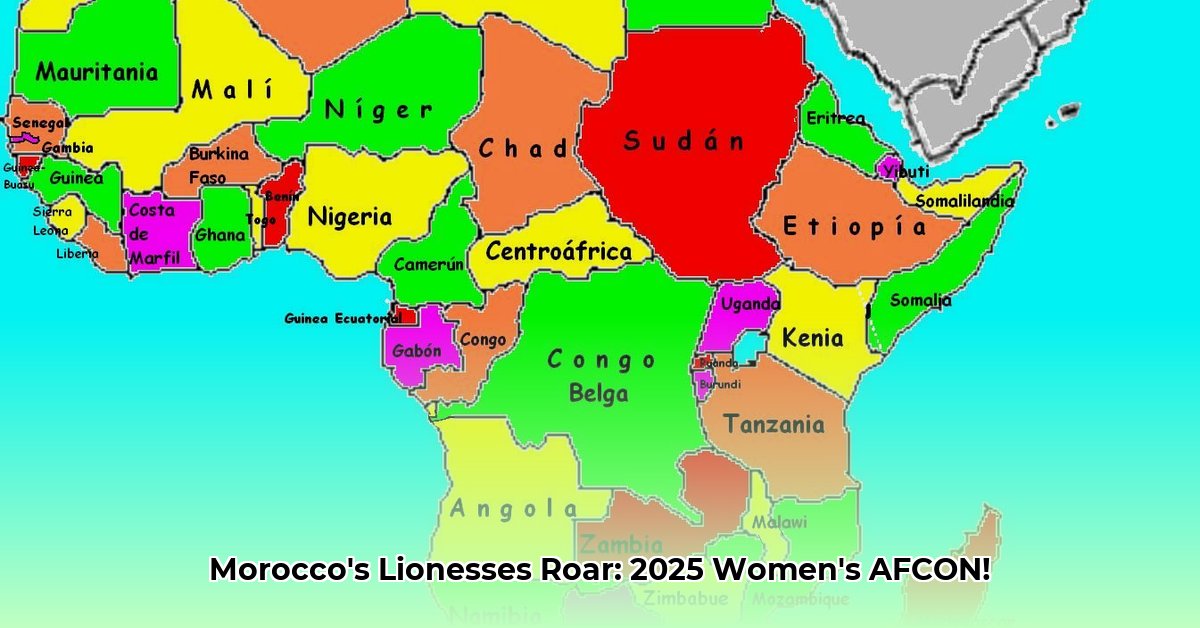
The 2025 Women's Africa Cup of Nations (WAFCON), hosted in Morocco, promises to be more than just a football tournament; it's a powerful statement about the burgeoning growth of women's football across Africa. This isn't simply a match; it's a celebration of skill, determination, and the unwavering spirit of African women athletes. But what exactly makes this WAFCON so special, and what challenges still lie ahead?
A Tournament on the Rise: Financial Growth and Global Impact
This year's WAFCON represents a significant leap forward. The substantial increase in prize money, a testament to the Confederation of African Football's (CAF) growing commitment to women's football, is a game-changer. But is this increased funding truly trickling down to grassroots levels, fostering the development of young talent? That's a vital question we need to consider. Will this investment translate into more opportunities for young girls to participate and hone their skills? Only time will tell.
Will this increased investment in WAFCON lead to a more visible increase in the development of young women football players across the continent?
Showcasing African Talent: Global Stars and Rising Icons
WAFCON 2025 will showcase a constellation of exceptional talent. Players currently dominating top leagues globally – the National Women's Soccer League (NWSL) in the US, leading European clubs, and even South American teams – will grace the Moroccan pitches. This international presence significantly elevates WAFCON's profile, attracting global attention and demonstrating the continent's rich footballing heritage. These players aren't just athletes; they're inspirational figures, role models for millions of young girls. But how can we ensure their continued success beyond the tournament's conclusion? Sustaining this momentum is paramount. What strategies can be implemented to maintain the spotlight on these incredible women after the final whistle?
"The level of talent at this WAFCON is simply breathtaking," says Nomusa Buthelezi, a renowned sports journalist and broadcaster with the SABC. "These women are not just playing football; they are redefining what is possible for young girls across Africa."
How can we ensure the continued success and visibility of these talented women beyond this tournament?
Navigating the Challenges: Media Coverage and Sponsorship
Despite the impressive progress, challenges remain. Securing sufficient sponsorships and garnering widespread media coverage are crucial for the long-term success of WAFCON. Will the tournament ever receive the same media attention as its male counterpart? This is a critical question that demands proactive solutions. We need more than just match highlights; in-depth coverage, human-interest narratives, and insightful analyses are necessary to illuminate the extraordinary journeys of these athletes. How can we work together to achieve this? This requires a concerted effort from various stakeholders. How can we ensure that this year's tournament receives the media attention it deserves and secures better sponsors?
"The media needs to step up and give WAFCON the kind of comprehensive coverage it's earned," says Dr. Fatima Hassan, a sports sociologist at the University of Cape Town. "We need storytelling that goes beyond the scores and highlights the broader social impact of women's football."
How do we amplify the voices and stories of these phenomenal women athletes and the profound impact WAFCON has on the lives of women and girls across the continent?
A Roadmap for Growth: Key Steps Towards a Sustainable Future
The growth of WAFCON is a multifaceted undertaking. Let's examine the key strategies for a thriving future:
CAF's Role: Complete transparency regarding financial management is vital. Implementing innovative marketing strategies to attract a larger audience and secure more sponsors is crucial. Post-tournament reviews are also needed to learn from both successes and setbacks. Long-term planning, including the possibility of tournament expansion or increased frequency, should be on the agenda.
National Federations: Investing in high-quality facilities and providing world-class training for national teams are fundamental. Grassroots development is equally important; nurturing young talent from a young age is essential for building a sustainable future.
Sponsors: Strategic partnerships with sponsors deeply committed to women's football – not just those seeking superficial publicity – are crucial. WAFCON represents a tremendous opportunity for brands to connect with a passionate and growing fanbase.
Media Outlets: Extensive media coverage, going beyond simple match reports, is needed. Dedicated reporting teams can help to share these women's stories, illuminating their challenges and triumphs.
Looking Ahead: A Legacy of Empowerment
The 2025 WAFCON is more than a sporting event; it's a movement driving positive change – a testament to gender equality, equal opportunities, and the recognition these extraordinary athletes deserve. The lasting impact of the tournament on the lives of women and girls across Africa will far surpass the final score. This is about dreams fulfilled, barriers broken, and a bright future for African women's football. What do you foresee for the future of WAFCON?